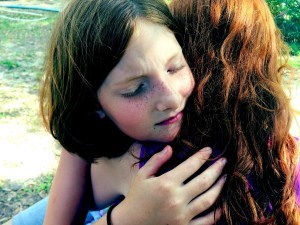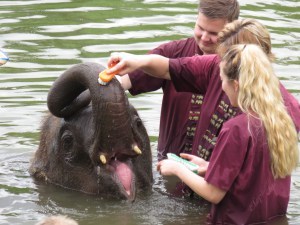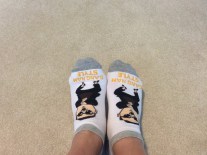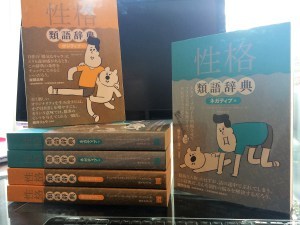Angela Ackerman's Blog: Writers Helping Writers, page 133
August 6, 2016
Emotional Wound Thesaurus Entry: Growing up with a Sibling’s Chronic or Complicated Illness
When you’re writing a character, it’s important to know why she is the way she is. Knowing her backstory is important to achieving this end, and one of the most impactful pieces of a character’s backstory is her emotional wound. This negative experience from the past is so intense that a character will go to great lengths to avoid experiencing that kind of pain and negative emotion again. As a result, certain behaviors, beliefs, and character traits will emerge.
Characters, like real people, are unique, and will respond to wounding events differently. The vast array of possible emotional wounds combined with each character’s personality gives you many options in terms of how your character will turn out. With the right amount of exploration, you should be able to come up with a character whose past appropriately affects her present, resulting in a realistic character that will ring true with readers. Understanding what wounds a protagonist bears will also help you plot out her arc, creating a compelling journey of change that will satisfy readers.
NOTE: We realize that sometimes a wound we profile may have personal meaning, stirring up the past for some of our readers. It is not our intent to create emotional turmoil. Please know that we research each wounding topic carefully to treat it with the utmost respect.

Courtesy: Pixabay
Examples: Getting through childhood can be difficult enough when life isn’t overly complicated. But having a sibling with chronic, long-term, or complex medical or emotional issues that require a lot of financial and physical attention from caregivers can have an impact on other children in the family. Some examples of these issues include
a traumatic brain injury
an undiagnosed illness
a failing organ in need of a transplant
congenital heart problems
seizure disorders
cancer
AIDS
cystic fibrosis, muscular dystrophy, cerebral palsy, and other long-term illnesses
life-threatening eating disorders
mental retardation
a physical disfigurement (loss of a limb, visible scarring, skin disorders, abnormal growths, etc.)
blindness, deafness, or muteness
mental disorders (OCD, depression, schizophrenia, bipolar disorder)
Basic Needs Often Compromised By This Wound: safety and security, love and belonging, esteem and recognition, self-actualization
False Beliefs That May Be Embraced As a Result of This Wound:
Someone (oneself, the sick child, a parent) must have done something wrong and is being punished.
It would have been better if he/she had never been born.
My parents love him/her more than me.
It doesn’t matter what I do; he/she will always be more important than me.
This (losing one’s home, parents divorcing, being unable to do something one loves) is all his/her fault.
I’m a horrible person for feeling anger/resentment/frustration about the situation.
It should have been me.
Positive Attributes That May Result: adaptable, appreciative, calm, curious, diplomatic, easygoing, empathetic, generous, gentle, honorable, idealistic, independent, kind, loyal, mature, nurturing, passionate, patient, pensive, philosophical, protective, responsible, sentimental, socially aware, supportive, tolerant
Negative Traits That May Result: apathetic, callous, catty, childish, cynical, dishonest, disloyal, frivolous, grumpy, humorless, impatient, insecure, manipulative, martyr, melodramatic, morbid, needy, nervous, oversensitive, perfectionist, pessimistic, rebellious, reckless, resentful, self-destructive, selfish, spoiled, subservient, temperamental, uncooperative, ungrateful, vindictive, volatile, withdrawn
Resulting Fears:
The same thing is going to happen to me.
My sibling is going to die.
My life is going to be like this forever.
I’ll never be able to do what I want to do.
My parents will never love me as much as him/her.
Possible Habits That May Emerge:
Avoiding the sibling when in public
Acting out as a way of getting a parent’s attention
Overachieving as a means of earning a parent’s love
Becoming independent out of necessity
Maturing early emotionally
Taking on adult responsibilities to care for one’s sibling
Empathizing with others who are ill
Engaging in social activism to raise awareness for the sibling’s illness
Becoming overly subservient so as not to overburden one’s parents
Hiding one’s true feelings because one feels guilty (about being angry, impatient, etc.)
Getting upset over little things
Distancing oneself from the family unit
Becoming anxious about oneself or a parent falling ill, too
Exhibiting hypochondriac tendencies (in an effort to get attention or out of the fear of oneself getting sick)
Rebelling against authority; becoming defiant
Difficulties at school
Difficulties focusing and concentrating
Acting out whenever the sibling’s circumstances interfere with one’s plans (when one has to stay with a relative, when a party or playdate has to be cancelled, etc.)
Shyness
Blaming all of one’s misfortunes on the sibling’s illness
Looking to others for love and affection
Self-medicating
TIP: If you need help understanding the impact of these factors, please read our introductory post on the Emotional Wound Thesaurus. For our current list of Emotional Wound Entries, go here.
For other Descriptive Thesaurus Collections, go here.
The post Emotional Wound Thesaurus Entry: Growing up with a Sibling’s Chronic or Complicated Illness appeared first on WRITERS HELPING WRITERS®.
August 4, 2016
What’s One Of The Best Ways To Reach Your Readers?
Hi Everyone!
I know, it’s summer and you guys are all taking a bit of a break, enjoying family, friends, sunshine and possibly the occasional adult beverage. That’s awesome! 
July 30, 2016
The Emotional Wound Thesaurus Is Retiring Soon
Becca and I have been profiling Emotional Wounds for quite a while now, and it’s getting to the point where we need to retire this thesaurus and start a new one.
I know some of you might be upset. The Emotional Wound Thesaurus is truly one-of-a-kind, tackling a topic that is difficult to master in writing.
 The good news is this: while we’re retiring the thesaurus, it’s for a good reason…so we can develop it further into a full-fledged book.
The good news is this: while we’re retiring the thesaurus, it’s for a good reason…so we can develop it further into a full-fledged book.
So, think of this thesaurus as merely being “on hold.” Down the road we’ll have a new resource for you that will be unlike anything else in your writing toolkit. 
July 26, 2016
Summer Check In + Writing Links

A long way from home!
Hi everyone! I hope everyone is getting some good R & R in during these warm, flower-filled summer months. In fact, I thought it might be fun to post a check in, to catch up on how everyone’s summer is going.
As some of you know, I’ve been out of the country for the last 3 weeks, visiting Malaysia, Thailand, and Korea. I love travel, and I am sure some of you do too, so here are a few highlights of the trip. These pictures are untouched (sorry Instagramers!)

Yep, I climbed all those stairs!
When we travel to these far-flung locations, we usually go on a group tour, one that really immerses a person in the culture while taking care of the flights, transfers, hotels, and many of the activities, so you can just enjoy, participate, and soak everything in.
We started off in Malaysia, checking out local markets, visiting war memorials, the palace, Muslim temples & Buddhist shrines…and so much more.

The Gibbon babies are orange when born, and slowly turn black. The cuteness!
We also hung out with monkeys and gibbons, saw fireflies, visited a tea plantation, ate some crazy stuff like jellyfish (like eating cartilage…not a repeat!), learned how to shoot darts with a blow gun, and went on a jungle hike to find a rare fungus-flower.
(The hike in the jungle was tough, and I’m pretty sure I got heat stroke–it was incredibly hot out. I also fell off a 5-foot high boulder and bashed up my legs quite bad, but luckily no broken bones.)

The main house
The highlight of Malaysia was a “home stay” visit where we lived with a Muslim family for a few days at the Suka-Suka Lake Retreat, where they owned some lovely property at the edge of the water.
You could swim, fish, kayak, walk the nature trails or hang out in a hammock and read (which I did and it was BLISS).
 My oldest son and I did a cooking lesson here and learned how to create some popular Malaysian dishes. Later, we dressed in sarongs and ate dinner in the traditional style: on the floor, using only our right hand. Messy, but fun!
My oldest son and I did a cooking lesson here and learned how to create some popular Malaysian dishes. Later, we dressed in sarongs and ate dinner in the traditional style: on the floor, using only our right hand. Messy, but fun!
The visit was extra special as we arrived at the end of Ramadan which is also the beginning of the Muslim New Year. So there was much celebrating, fireworks, and socializing, and what a treat to be invited into the locals’ homes and experience another culture’s celebrations first hand.

Railay beach…usually the water is crystal clear, but we’ve come during the rainy season.
In Thailand, we started out at Krabi, just beating out a monsoon that showed up after we left. We traveled to the world-famous Railay Beach, and loved all the rock formations that reminded us so much of Halong Bay in Vietnam.
Ironically, while in the water here I was stung by a jellyfish…I guess it was karma for eating a relative a few nights earlier!

Hubs with one big Buddha!
We also saw a ton of Buddhist temples and ruins, often traveling around on tuk-tuks or by boat.
We stopped to see the famous bridge on the River Kwae and swam in a 7 level waterfall filled with fish (the small ones liked to go after our feet in a “Au natural” fish massage, lol). It was hilarious to see the reaction of our tour mates who have never felt fish nibble at their feet!
One night we stayed on a floating house that was pulled out by tugboat to a private island on a lake. We swam, kayaked and drank Chang beer as the sun went down.

Very tranquil
There were geckos EVERYWHERE too, living on the floating house, chomping down on all the mosquitoes. I’d fall asleep watching them skitter back and forth across the ceiling of the boathouse, chasing their dinner.
At the end of our time in Thailand, we spent a day at an Elephant Rescue Park, one that was truly a rescue, with no riding, no tricks for tourists, just a sanctuary for elephants to roam and live free.

They would nuzzle our pockets, trying to grab the sugarcane we had there, haha!
The elephants there were purchased by the sanctuary’s owners from circuses, tourist riding attractions, and illegal logging camps, saving the elephants from a lifetime of misery and abuse.

This one loved it when I scrubbed his trunk!
We spent the day feeding three young elephants bananas and sugarcane, accompanying them on a walk, and finally bathing them in a river.
It was something I will never forget.
After this, it was time to leave our group and set off for Korea, then home.
 We arranged a 10 hour layover, enough time to see a bit of Seoul.
We arranged a 10 hour layover, enough time to see a bit of Seoul.
While we didn’t have time to visit the DMZ, we did venture into the city for a bit of site-seeing.
All of us enjoyed the time we spent there and I could see us heading back again for another trip.

Because, Korea!
I tooled around the market too, and found these gems:
We continued our marathon travel back home, (about 38 hours all told). Exhausting.
I came home to roughly 1000 emails, and a nice surprise…more foreign editions from Japan, this time, The Positive and Negative Trait Thesaurus books.
 While the covers seem unusual to me, I know they must make perfect sense for that market.
While the covers seem unusual to me, I know they must make perfect sense for that market.
Our Japanese publisher made us two beautiful books–they are just incredibly well laid out in the interior, and you can feel the quality. I’m really happy with them and hope they are as popular as the Emotion Thesaurus is over there.
 And, as if this coolness wasn’t enough, I also came home to The Writers’ Guild of Alberta’s magazine…and a familiar face on the cover. Crazy right?
And, as if this coolness wasn’t enough, I also came home to The Writers’ Guild of Alberta’s magazine…and a familiar face on the cover. Crazy right?
Inside there’s an interview with me written by phenomenal YA author Janet Gurtler, and what’s so fun is that they used a bunch of my photos from my last big trip (Australia) in the article. Seeing this sort of made my vacation feel like it had come full circle! Such a wonderful homecoming.
So, that’s been my summer so far! What about you? Are you relaxing? Gardening? Traveling? Writing? Reading? Let me know all about it!
I managed to get a few books read during my trip–the second and third book in the Miss Peregrine’s Home for Peculiar Children series (so terrific!), and also the mammoth novel Dune (an oldie but a goodie.)
Your turn. Fill me in on your summer plans!

July 23, 2016
Emotional Wounds Thesaurus: Being Kidnapped (the Aftermath)
When you’re writing a character, it’s important to know why she is the way she is. Knowing her backstory is important to achieving this end, and one of the most impactful pieces of a character’s backstory is her emotional wound. This negative experience from the past is so intense that a character will go to great lengths to avoid experiencing that kind of pain and negative emotion again. As a result, certain behaviors, beliefs, and character traits will emerge.
Characters, like real people, are unique, and will respond to wounding events differently. The vast array of possible emotional wounds combined with each character’s personality gives you many options in terms of how your character will turn out. With the right amount of exploration, you should be able to come up with a character whose past appropriately affects her present, resulting in a realistic character that will ring true with readers. Understanding what wounds a protagonist bears will also help you plot out her arc, creating a compelling journey of change that will satisfy readers.

Courtesy: Pixabay
NOTE: We realize that sometimes a wound we profile may have personal meaning, stirring up the past for some of our readers. It is not our intent to create emotional turmoil. Please know that we research each wounding topic carefully to treat it with the utmost respect.
Examples: Escaping or being rescued from being held captive. This entry deals with the long-term effects after having escaped a kidnapping. For more information on the wounds one would experience while being held captive, see this entry.
Basic Needs Often Compromised By This Wound: safety and security, love and belonging, esteem and recognition, self-actualization
False Beliefs That May Be Embraced As a Result of This Wound:
If I don’t watch out, it could happen to me again.
I’m an easy mark, a target.
He’s out there watching me, waiting for another opportunity (if one’s kidnapper remains at large)
My life as I knew it is over.
I will never be whole again.
The others didn’t make it out; I shouldn’t have, either. (survivor’s guilt)
My captor wasn’t all bad. (Stockholm syndrome)
Positive Attributes That May Result: alert, appreciative, bold, cautious, disciplined, empathetic, independent, industrious, inspirational, meticulous, observant, patient, persistent, private, proactive, protective, resourceful, socially aware,
Negative Traits That May Result: addictive, callous, compulsive, controlling, devious, evasive, flaky, frivolous, hostile, humorless, ignorant, impulsive, inflexible, inhibited, insecure, irrational, manipulative, morbid, needy, nervous, obsessive, paranoid, possessive, prejudiced, promiscuous, rebellious, reckless, resentful, self-destructive, subservient, suspicious, temperamental, timid, uncommunicative, uncooperative, volatile, weak-willed, withdrawn
Resulting Fears:
I can’t take care of myself, much less anyone else.
I can’t survive on my own.
I’ll never readjust to live in normal society.
No one could ever love me now.
I’m crippled; I’ll never be able to achieve my dreams.
I’m not worthy of anyone’s love or affection.
No one is trustworthy.
The only person I can count on is me.
I need someone else to take care of me.
Possible Habits That May Emerge:
Becoming overly cautious
Hyperawareness of one’s surroundings
Sensitivity to trigger stimuli (the smell of the captor’s cologne, sounds from one’s captivity, etc.)
Withdrawing from friends and loved ones
Difficulty trusting others
Fatigue due to nightmares
Becoming obsessed with security (taking self-defense classes, getting a gun, buying a dog, etc.)
Taking steps to leave one’s past behind (changing one’s name, moving, etc.)
Depression
Losing interest in hobbies and interests one used to enjoy
Being overprotective of one’s children
Difficulty adjusting to changes that have occurred in the world since one’s abduction
Being evasive or dishonest out of a desire to protect one’s privacy
Reliving certain traumas over and over
Self-medicating
Thoughts or attempts of suicide
Flying under everyone’s radar so as not to draw attention to oneself
Feeling empathy for one’s kidnapper, followed by feelings of guilt over one’s empathy
Self-loathing over things that happened or one’s inability to escape or stop them from happening
TIP: If you need help understanding the impact of these factors, please read our introductory post on the Emotional Wound Thesaurus. For our current list of Emotional Wound Entries, go here.
For other Descriptive Thesaurus Collections, go here.
The post Emotional Wounds Thesaurus: Being Kidnapped (the Aftermath) appeared first on WRITERS HELPING WRITERS®.
July 19, 2016
Critiques 4 U
Well, it’s summertime in my neck of the woods and I’m having a blast—sleeping in, spending time with my kids, and enjoying the weather. Now if only I had some good reading material…Aha!

Courtesy: Pixabay
It’s Critiques 4 U Time!
If you’re working on a first page and would like some objective feedback, please leave a comment that includes:
1) your email address. Some of you have expressed concern about making your email address public; if you’re sure that the email address associated with your WordPress account is correct, you don’t have to include it here. But if you do win and I’m unable to contact you through that email address, I’ll have to choose an alternate winner.
2) your story’s genre (no erotica, please)
ONLY ENTRIES THAT FOLLOW THESE INSTRUCTIONS WILL BE CONSIDERED
Three commenters’ names will be randomly drawn and posted tomorrow. If you win, you can email me your first page and I’ll offer my feedback. Best of luck!
The post Critiques 4 U appeared first on WRITERS HELPING WRITERS®.
July 16, 2016
Emotional Wound Entry: Discovering One’s Parent is a Monster
When you’re writing a character, it’s important to know why she is the way she is. Knowing her backstory is important to achieving this end, and one of the most impactful pieces of a character’s backstory is her emotional wound. This negative experience from the past is so intense that a character will go to great lengths to avoid experiencing that kind of pain and negative emotion again. As a result, certain behaviors, beliefs, and character traits will emerge.
 Characters, like real people, are unique, and will respond to wounding events differently. The vast array of possible emotional wounds combined with each character’s personality gives you many options in terms of how your character will turn out. With the right amount of exploration, you should be able to come up with a character whose past appropriately affects her present, resulting in a realistic character that will ring true with readers. Understanding what wounds a protagonist bears will also help you plot out her arc, creating a compelling journey of change that will satisfy readers.
Characters, like real people, are unique, and will respond to wounding events differently. The vast array of possible emotional wounds combined with each character’s personality gives you many options in terms of how your character will turn out. With the right amount of exploration, you should be able to come up with a character whose past appropriately affects her present, resulting in a realistic character that will ring true with readers. Understanding what wounds a protagonist bears will also help you plot out her arc, creating a compelling journey of change that will satisfy readers.
NOTE: We realize that sometimes a wound we profile may have personal meaning, stirring up the past for some of our readers. It is not our intent to create emotional turmoil. Please know that we research each wounding topic carefully to treat it with the utmost respect.
DISCOVERING ONE’S PARENT IS A MONSTER
Examples:
A parent convicted of being a pedophile
The discovery that one’s parent has committed murder
Having one’s parent outed as a serial killer
A parent who abuses children (physically, emotionally, or both)
A parent who likes to cause animals pain or kill them for fun
Finding out one’s parent is poisoning people to make them sick
A parent who is a kidnapper
A parent who police discover has captives on the property or in a hidden basement area
Discovering one’s parent is a human trafficker
A parent who exploits vulnerable people for personal gain
Finding out that one’s parent practices sacrifice and taboo blood rituals
Discovering one’s parent is also a cannibal
Finding out one’s parent likes to torture others
Basic Needs Often Compromised By This Wound: physiological needs, safety and security, love and belonging, esteem and recognition, self-actualization
False Beliefs That May Be Embraced As a Result of This Wound:
I should have see this about (mom or dad). My judgement can’t be trusted.
Everything I know is a lie
My (mom or dad) isn’t human. Maybe I’m not either
With (mom or dad) as my parent, I am defective
I can never lead a normal life
People will judge me no matter what I do because who (mom or dad) is, so why try to fit in?
My (mom or dad) never loved me–how could they and do what they did?
I should stay away from people for their own protection
My dreams are dead. I can never go on to do great things with this hanging over me
People will only see me as the son or daughter of a (pedophile, serial killer, madman, etc.) so I must keep this a secret from everyone
Positive Attributes That May Result: appreciative, calm, centered, courageous, disciplined, focused, generous, gentle, honorable, independent, industrious, introverted, just, kind, loyal, merciful, nurturing, patient, pensive, protective, responsible, socially aware, spiritual, supportive, wise
Negative Traits That May Result: addictive, antisocial, compulsive, confrontational, cynical, defensive, dishonest, evasive, fanatical, humorless, impulsive, inhibited, insecure, jealous, martyr, morbid, needy, nervous, paranoid, pessimistic, rebellious, resentful, self-destructive, temperamental, timid, uncommunicative, uncooperative, withdrawn, worrywart
Resulting Fears:
Fear of genetics
Fear of oneself and what one might be capable of
Fear of one’s past being found out
Fear of being universally hated
Fear of reporters, the media, and information gathering systems
Fear of the public eye
Fear of trusting the wrong person with the truth
Fear of becoming a mother or father, and passing defective genes along
Possible Habits That May Emerge:
changing one’s identity
moving frequently or when one feels threatened (even if it is just in one’s own mind)
keeping secrets
avoiding relationships
keeping to oneself, not engaging with neighbors or one’s community
avoiding family members and friends from one’s past
avoiding social media
avoiding places and situations that remind one of what one’s parent did
googling oneself to see if anything comes up
beating oneself up for normal urges and thoughts, believing them to be indications of something sinister
Refusing to read books or watch TV/movies with situations that hit close to home (Or, obsessively watching/reading in hopes of insight & answers)
TIP: If you need help understanding the impact of these factors, please read our introductory post on the Emotional Wound Thesaurus. For our current list of Emotional Wound Entries, go here.
For other Descriptive Thesaurus Collections, go here.
Image: Isabellaquintana @pixabay
Save
Save
Save
The post Emotional Wound Entry: Discovering One’s Parent is a Monster appeared first on WRITERS HELPING WRITERS®.
July 12, 2016
Great Writing Links You Don’t Want To Miss
This is a bit weird…I’m writing this, but by the time you read it, I’ll be wearing a backpack somewhere in Asia. So, really, it’s like I’m reaching out from the beyond. I’m a ghost!
 *ghost noises* Okay, maybe that’s a bit dramatic.
*ghost noises* Okay, maybe that’s a bit dramatic.
Anyway, I just wanted to mention that before I ducked out the back door and left Becca with all the work (sorry Becca!) I did a mad hop across the internet, guest posting all over the place.
And heck, there might be some good nuggets out there waiting for you. : ) So I’ll leave a few links below in case you want to check them out.
First up, do you know what the 5 Biggest Mistakes are when it comes to describing the setting? Just head on over to DIY MFA and find out!
Are you writing a protagonist who has been wounded deeply and now has a hard time trusting other people? I wouldn’t be surprised. Many characters have vulnerability issues, and if yours is one of them, you might find Vulnerability In Fiction: Teaching Jaded Characters How To Trust helpful to read.
Are you drafting a new novel and feeling a bit insecure? It’s okay if you are–many of us feel that way at times. That’s why I designed this writing pep talk: Be Braver Than You Ever Thought Possible.
And finally, one of the biggest decisions you will make for each scene is where the action will take place. Setting can make or break your scene, so stop by Kobo Writing Life and read Writing Powerful Scenes: Why Choosing The Right Setting Is So Important.
Happy Writing!
Angela
Save
The post Great Writing Links You Don’t Want To Miss appeared first on WRITERS HELPING WRITERS®.
July 9, 2016
Emotional Wounds Thesaurus: Being Held Captive
When you’re writing a character, it’s important to know why she is the way she is. Knowing her backstory is important to achieving this end, and one of the most impactful pieces of a character’s backstory is her emotional wound. This negative experience from the past is so intense that a character will go to great lengths to avoid experiencing that kind of pain and negative emotion again. As a result, certain behaviors, beliefs, and character traits will emerge.
Characters, like real people, are unique, and will respond to wounding events differently. The vast array of possible emotional wounds combined with each character’s personality gives you many options in terms of how your character will turn out. With the right amount of exploration, you should be able to come up with a character whose past appropriately affects her present, resulting in a realistic character that will ring true with readers. Understanding what wounds a protagonist bears will also help you plot out her arc, creating a compelling journey of change that will satisfy readers.
NOTE: We realize that sometimes a wound we profile may have personal meaning, stirring up the past for some of our readers. It is not our intent to create emotional turmoil. Please know that we research each wounding topic carefully to treat it with the utmost respect.

Pixabay
Examples:
Being kidnapped and held for ransom
Being kidnapped and held captive for an extended period of time
Being kidnapped and sold into slavery
Being kidnapped by one’s biological parent or other relative and taken underground
Basic Needs Often Compromised By This Wound: physiological needs, safety and security, love and belonging, esteem and recognition, self-actualization
False Beliefs That May Be Embraced As a Result of This Wound:
I’ll never get away.
If I had done X (paid more attention, not talked to the person, left work 5 minutes later, etc.), this wouldn’t have happened.
I’ll never be safe.
I’m a weak person (because he targeted me, because I’m too afraid to attempt escape).
Specific beliefs that arise as a result of brainwashing by one’s captor: No one is looking for me/cares about me; this is a punishment for something I’ve done, etc.).
Positive Attributes That May Result: alert, cautious, discreet, nurturing, obedient, observant, persistent, private, protective
Negative Traits That May Result: apathetic, childish, cynical, devious, evasive, flaky, forgetful, hostile, humorless, inattentive, indecisive, inhibited, irrational, morbid, needy, nervous, obsessive, paranoid, reckless, resentful, scatterbrained, self-destructive, subservient, suspicious, temperamental, timid, uncommunicative, uncooperative, volatile, weak-willed, withdrawn
Resulting Fears:
Fear of never being able to escape
Fear of not being able to adjust to the real world after escaping
Fear for the safety of one’s loved ones
Fear that the things endured during captivity will cause loved ones to stop loving one
Fear of men (if one’s kidnapper is a man)
Fear of specific triggers (smells, sounds, etc.) associated with one’s captor or prison
Possible Habits That May Emerge:
Becoming extremely subservient; losing one’s will
Wanting to please one’s captor
Clinging to one’s captor
Withdrawing into oneself
Decreased reactions to stimuli
Becoming emotionally numb
Hyper vigilance
Startling easily
Impaired concentration, focus, and memory
Depression
Suicidal thoughts
Sleeping longer than normal
Insomnia
Feeling powerless
Becoming fearful or anxious
Regressing into a childlike state
Difficulty telling reality from fantasy
Becoming addicted to drugs or alcohol (if one’s captor is using them as a controlling factor)
TIP: If you need help understanding the impact of these factors, please read our introductory post on the Emotional Wound Thesaurus. For our current list of Emotional Wound Entries, go here.
For other Descriptive Thesaurus Collections, go here.
The post Emotional Wounds Thesaurus: Being Held Captive appeared first on WRITERS HELPING WRITERS®.
July 6, 2016
Some Setting Tips and a Giveaway!
Hi, everyone! Angela and I are taking a leisurely summer this year, with no big projects or deadlines looming, enabling us to enjoy the weather, spend time with family, and relax. I hope you’re enjoying the season—whatever it is in your part of the world!
That’s not to say we’re just sitting around sipping cocktails and sunbathing. Oh no, my precious. We’re still getting SOME work done. For instance, Katie Weiland has generously allowed me to take over her blog today to talk about choosing the right setting for a scene. Katie is a genius blogger with tons of incredible content—particularly in the area of structure. Have you seen her Story Structure Database? Oh my gosh, people. It’s a must-see. Right after my post, of course. 
Writers Helping Writers
- Angela Ackerman's profile
- 1014 followers



